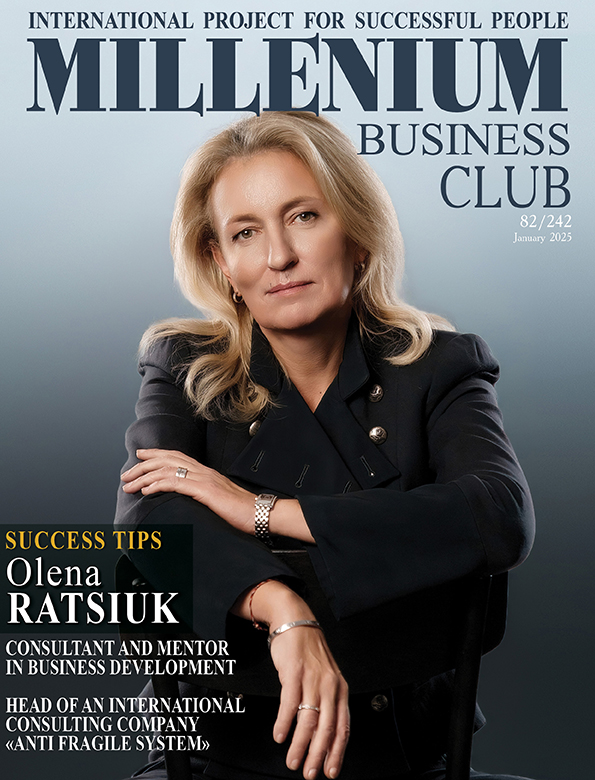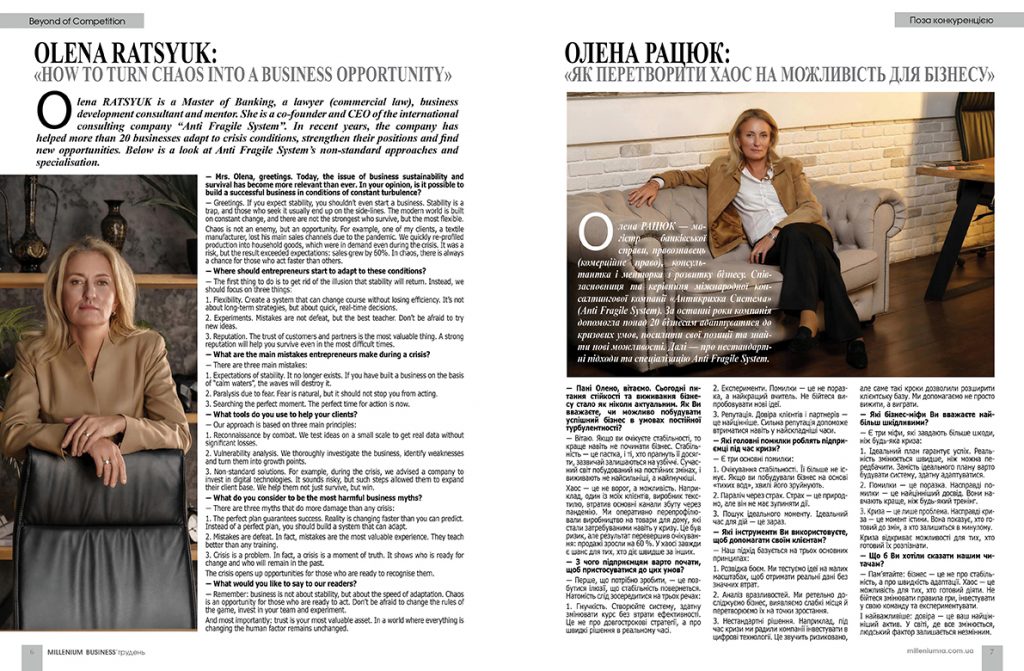
ОЛЕНА РАЦЮК:
«ЯК ПЕРЕТВОРИТИ ХАОС НА МОЖЛИВІСТЬ ДЛЯ БІЗНЕСУ»
Олена РАЦЮК — магістр банківської справи, правознавець (комерційне право), консультантка і менторка з розвитку бізнесу. Співзасновниця та керівниця міжнародної консалтингової компанії «Антикрихка Система» (Anti Fragile System). За останні роки компанія допомогла понад 20 бізнесам адаптуватися до кризових умов, посилити свої позиції та знайти нові можливості. Далі — про нестандартні підходи та спеціалізацію Anti Fragile System.
— Пані Олено, вітаємо. Сьогодні питання стійкості та виживання бізнесу стало як ніколи актуальним. Як Ви вважаєте, чи можливо побудувати успішний бізнес в умовах постійної турбулентності?
— Вітаю. Якщо ви очікуєте стабільності, то краще навіть не починати бізнес. Стабільність — це пастка, і ті, хто прагнуть її досягти, зазвичай залишаються на узбіччі. Сучасний світ побудований на постійних змінах, і виживають не найсильніші, а найгнучкіші.
Хаос — це не ворог, а можливість. Наприклад, один із моїх клієнтів, виробник текстилю, втратив основні канали збуту через пандемію. Ми оперативно перепрофілювали виробництво на товари для дому, які стали затребуваними навіть у кризу. Це був ризик, але результат перевершив очікування: продажі зросли на 60 %. У хаосі завжди є шанс для тих, хто діє швидше за інших.
— З чого підприємцям варто почати, щоб пристосуватися до цих умов?
— Перше, що потрібно зробити, — це позбутися ілюзії, що стабільність повернеться. Натомість слід зосередитися на трьох речах:
- Гнучкість. Створюйте систему, здатну змінювати курс без втрати ефективності. Це не про довгострокові стратегії, а про швидкі рішення в реальному часі.
- Експерименти. Помилки — це не поразка, а найкращий вчитель. Не бійтеся випробовувати нові ідеї.
- Репутація. Довіра клієнтів і партнерів — це найцінніше. Сильна репутація допоможе втриматися навіть у найскладніші часи.
— Які головні помилки роблять підприємці під час кризи?
— Є три основні помилки: - Очікування стабільності. Її більше не існує. Якщо ви побудували бізнес на основі «тихих вод», хвилі його зруйнують.
- Параліч через страх. Страх — це природно, але він не має зупиняти дії.
- Пошук ідеального моменту. Ідеальний час для дій — це зараз.
— Які інструменти Ви використовуєте, щоб допомагати своїм клієнтам?
— Наш підхід базується на трьох основних принципах: - Розвідка боєм. Ми тестуємо ідеї на малих масштабах, щоб отримати реальні дані без значних втрат.
- Аналіз вразливостей. Ми ретельно досліджуємо бізнес, виявляємо слабкі місця й перетворюємо їх на точки зростання.
- Нестандартні рішення. Наприклад, під час кризи ми радили компанії інвестувати в цифрові технології. Це звучить ризиковано, але саме такі кроки дозволили розширити клієнтську базу. Ми допомагаємо не просто вижити, а виграти.
— Які бізнес-міфи Ви вважаєте найбільш шкідливими?
— Є три міфи, які завдають більше шкоди, ніж будь-яка криза: - Ідеальний план гарантує успіх. Реальність змінюється швидше, ніж можна передбачити. Замість ідеального плану варто будувати систему, здатну адаптуватися.
- Помилки — це поразка. Насправді помилки — це найцінніший досвід. Вони навчають краще, ніж будь-який тренінг.
- Криза — це лише проблема. Насправді криза — це момент істини. Вона показує, хто готовий до змін, а хто залишиться в минулому.
Криза відкриває можливості для тих, хто готовий їх розпізнати.
— Що б Ви хотіли сказати нашим читачам?
— Пам’ятайте: бізнес — це не про стабільність, а про швидкість адаптації. Хаос — це можливість для тих, хто готовий діяти. Не бійтеся змінювати правила гри, інвестувати у свою команду та експериментувати.
І найважливіше: довіра — це ваш найцінніший актив. У світі, де все змінюється, людський фактор залишається незмінним.

OLENA RATSYUK:
«HOW TO TURN CHAOS INTO A BUSINESS OPPORTUNITY»
Оlena RATSYUK is a Master of Banking, a lawyer (commercial law), business development consultant and mentor. She is a co-founder and CEO of the international consulting company “Anti Fragile System”. In recent years, the company has helped more than 20 businesses adapt to crisis conditions, strengthen their positions and find new opportunities. Below is a look at Anti Fragile System’s non-standard approaches and specialisation.
— Mrs. Olena, greetings. Today, the issue of business sustainability and survival has become more relevant than ever. In your opinion, is it possible to build a successful business in conditions of constant turbulence?
— Greetings. If you expect stability, you shouldn’t even start a business. Stability is a trap, and those who seek it usually end up on the side-lines. The modern world is built on constant change, and there are not the strongest who survive, but the most flexible.
Chaos is not an enemy, but an opportunity. For example, one of my clients, a textile manufacturer, lost his main sales channels due to the pandemic. We quickly re-profiled production into household goods, which were in demand even during the crisis. It was a risk, but the result exceeded expectations: sales grew by 60%. In chaos, there is always a chance for those who act faster than others.
— Where should entrepreneurs start to adapt to these conditions?
— The first thing to do is to get rid of the illusion that stability will return. Instead, we should focus on three things:
- Flexibility. Create a system that can change course without losing efficiency. It’s not about long-term strategies, but about quick, real-time decisions.
- Experiments. Mistakes are not defeat, but the best teacher. Don’t be afraid to try new ideas.
- Reputation. The trust of customers and partners is the most valuable thing. A strong reputation will help you survive even in the most difficult times.
— What are the main mistakes entrepreneurs make during a crisis?
— There are three main mistakes: - Expectations of stability. It no longer exists. If you have built a business on the basis of “calm waters”, the waves will destroy it.
- Paralysis due to fear. Fear is natural, but it should not stop you from acting.
- Searching the perfect moment. The perfect time for action is now.
— What tools do you use to help your clients?
— Our approach is based on three main principles: - Reconnaissance by combat. We test ideas on a small scale to get real data without significant losses.
- Vulnerability analysis. We thoroughly investigate the business, identify weaknesses and turn them into growth points.
- Non-standard solutions. For example, during the crisis, we advised a company to invest in digital technologies. It sounds risky, but such steps allowed them to expand their client base. We help them not just survive, but win.
— What do you consider to be the most harmful business myths?
— There are three myths that do more damage than any crisis: - The perfect plan guarantees success. Reality is changing faster than you can predict. Instead of a perfect plan, you should build a system that can adapt.
- Mistakes are defeat. In fact, mistakes are the most valuable experience. They teach better than any training.
- Crisis is a problem. In fact, a crisis is a moment of truth. It shows who is ready for change and who will remain in the past.
The crisis opens up opportunities for those who are ready to recognise them.
— What would you like to say to our readers?
— Remember: business is not about stability, but about the speed of adaptation. Chaos is an opportunity for those who are ready to act. Don’t be afraid to change the rules of the game, invest in your team and experiment.
And most importantly: trust is your most valuable asset. In a world where everything is changing the human factor remains unchanged.
